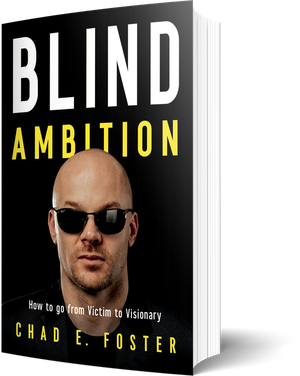Walking the halls of my University of Tennessee classes had become quite the feat. My vision was fading quickly, and it was becoming increasingly impossible to act as if nothing were wrong. Every time I went from the naturally lit breezeways into the buildings, I was instantly plunged into black for several seconds as my imperfect eyes attempted to adjust to the artificial light that bathed the university hallways.
I tried with every ounce of my being to walk with my confident, assertive stride. But now, my confidence betrayed me as I would bump into things, and sometimes, bump into passersby’s. At this point, I didn’t use a cane, and I had not even considered a guide dog. I was driving a car just months before, and now here I was unable to walk safely across campus.
The truth is, I was trying to hide my imminent blindness and the implications it carried. I did not want to admit that the gift of eyesight was leaving my life. I felt embarrassed and even ashamed of my condition, even though it wasn’t my fault—wasn’t anyone’s fault. It was the unlucky coin flip of inherited genetics that I had to deal with. I was self-conscious, angry, sad, and ready for anything that could take my mind off of it—even for just a few minutes.
Fortunately, a local Lions Club graciously offered to sponsor a Leader Dog for me. Leader Dogs is a guide dog organization in Michigan that offers highly trained guide dogs for those with low-to-no eyesight. I soon found out, although they offer guide dogs, they provide much more than mobility.
Working with Miles, my first guide dog was a transformational experience on a number of levels. Chief among them, with my super-intelligent 100-pound German shepherd guide dog faithfully leading me around, I could no longer hide the very thing I’d been avoiding. Miles symbolized my blindness. It was unavoidable. He was unmistakable, and that catharsis forced me to embrace my eye disease, but more importantly, it compelled me to expose me—all of me, even the ugly imperfect parts.
An interesting thing started to happen in the months that followed. No longer was I weighed down by the burden of pretending I could see just fine. I could be myself—I had to be myself—and the burden I’d been carrying around started to dissolve. I became lighter, more comfortable in my own skin, and soon, my confidence began to recover.
Since those initial moments on campus in my early 20’s, I’ve learned just how crucial it is to love me, all of me—including my perceived imperfections. And until we can be unapologetically authentic, we never unleash our full potential. We all have imperfections. We all have the instincts to hide them. What imperfections are you trying to hide? What’s stopping you from being unapologetically you?
